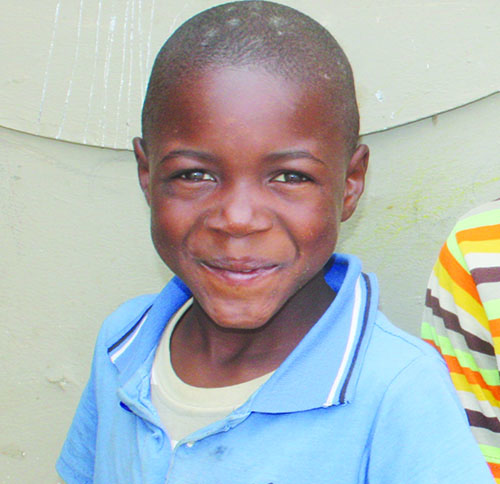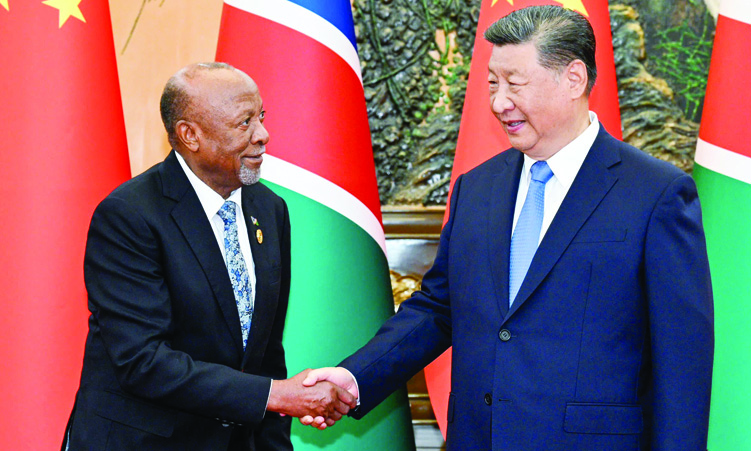PAULUS SHIKUMANY children look forward to the festive season, especially Christmas Day and New Year, in anticipation of great fun, travels, relaxation and presents.
While some children in Namibia indeed have the privilege of receiving gifts from parents and family members during this time, the festive period almost goes unnoticed for many others.
The young boys and girls living in impoverished places such as Swakopmund’s DRC informal settlement in the Erongo region, are amongst those who hold no special memories of opening Christmas presents this past festive season.
For many of them, Christmas and New Year were just like any other day. They received no presents and they still had to do work around the house without any relaxation or play time. There were no holiday trips to Etosha National Park or even to the Swakopmund beach – nothing to give them any special pleasure or material joy that is usually associated with this period.
The children did not only miss out on presents but also on special meals, which are usually prepared to celebrate Christmas.
Four-year-old Nicoline Kambahepa, who was seen fetching water from a public tap with her father Nicklaas Kambahepa, is one of those who did not receive any gifts during the past festive season.
Her father said he wished he had money to buy his daughter something special for this period, but he got a new job and is yet to receive his salary.
Seven-year-old Genesis Jafet also waited in vain for a special Christmas or New Year’s treat.
“We never receive presents – not even a special meal. On Christmas, we just eat the usual pap and fish that we’ve been eating throughout the year,” Jafet said, hinting that her ideal present would be a pair of shoes.
Hafeni Mandume Petrus, who is five years old, was one of the lucky children to have received a pair of jeans, a shirt, short pants, T-shirt and a pair of shoes as Christmas presents from his mother Rauha Lukeiko.
A proud Petrus said he wore his new clothes and went to church on Christmas Day and on New Year’s Eve.
Lukeiko told Nampa that with the little she has, she makes it a habit to buy something new for Petrus every festive period.
Four-year-old Tia Aribes, who stays with her aunt, Angela Aribes, said she never has received a Christmas or New Year present.
She said her aunt wanted to buy her something nice, but she received her salary only on 31 December, which was a bit too late.
“She has promised to buy me a gift on my birthday and I want a baby doll,” said Tia, when asked what she would prefer for her birthday.
Cecilia Fellus (10) also noted that she never received a gift during the festive period, although her father had apparently promised to buy her a laptop sometime this year.
“My father said he will buy me a laptop because I passed Grade three,” she responded.
Parents Nampa spoke to in the DRC informal settlement said although they are willing to give gifts to their children on Christmas and New Year’s Day, they simply do not have the money to do so.
In her story posted on the Travel Africa website, Anouk Zijlma; an Africa Travel Expert, explains that many Africans do not buy Christmas gifts, as they have no money.
“Many Africans are too poor to afford presents for their kids and there aren’t too many toy stores in rural Africa to shop at anyway. If gifts are exchanged in poorer communities, they usually come in the form of school books, soap, clothes, candles and other practical goods,” she said.
She said unlike in Europe and America where the emphasis is commercial, in Africa the emphasis is more on the religious aspect of celebrating the birth of Jesus Christ by singing in churches, and less on giving gifts.
“In Ghana, Christmas dinner is not complete without fufu and okra soup. In Liberia, rice, beef and biscuits are the order of the day. Zimbabweans make sure there’s plenty of bread, jam and tea to enjoy along with their goat meat,” Zijlma wrote.
In Namibia, especially in the rural areas, families go to church and when they return, an animal is usually slaughtered and traditional brew prepared for celebration.
Parents who can afford to buy gifts, which are mostly clothes and shoes, can buy and give their children such gifts during these festivities.
– Nampa
Stay informed with The Namibian – your source for credible journalism. Get in-depth reporting and opinions for
only N$85 a month. Invest in journalism, invest in democracy –
Subscribe Now!






